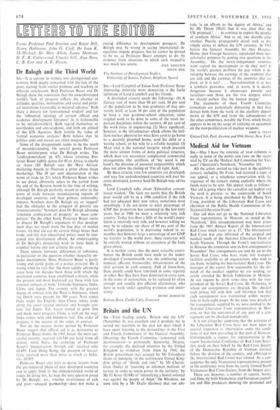Britain and the UN
SIR,—Your leading article, 'Britain and the UN' (November 4), was excellent and it prompts me to record my reactions to the past ten days which I have spent listening to the proceedings in the First and Fourth Committees of the General Assembly. Observing the Fourth Committee—concerned with decolonisation--is profoundly depressing. Despite, for example, the declared intention by the United Kingdom to withdraw from Aden by 1968, the British government was accused by Mr Esfandiary (Iran) of indulging 'in the well-known United King- dom policy of "divide and rule," by Mr Charm- khan (India) of 'resorting to inhuman methods of torture in order to retain power in the territory,' by Mr El Kouy (UAR) of 'intensifying a brutal colonial war against the people of Aden.' On Rhodesia, we were told by a Mr Diallo (Guinea) that our atti-
tude 'is an affront to the dignity of Africa,' and by Mr Thiam (Mali) that it was clear that the UK proposed . . to continue to exploit the peoples of southern Africa.' And so on, one diatribe after another. Puerile, propagandist drivel such as this simply serves to debase the UN currency. In 1963 before the General Assembly Sir Alec Douglas- Home, then Foreign Secretary, repudiated these neo- colonialist polemics by putting two questions to the Assembly: `Do the newly-independent countries want capital for development or do they not? Is the world's greatest problem the gap which is de- veloping between the earnings of the countries that are rich and the earnings of the countries that are poor, or is it not? . . . Neo-colonialism is at best a synthetic grievance, and, at worst, it is deadly dangerous because it encourages poverty and racialism—and those are the two dangers which we should eschew like the human plague.'
The statements of these Fourth Committee comedians are particularly distressing in that they detract both from the work of the ancillary depart- ments of the UN and from the achievements of the other committees, notably the First, which finally appears to be on the verge of ratifying an agreement on the non-proliferation of nuclear weapons.
JOHN G. CLUFF
Union Club, Park Avenue and 69th Street, New York














































 Previous page
Previous page